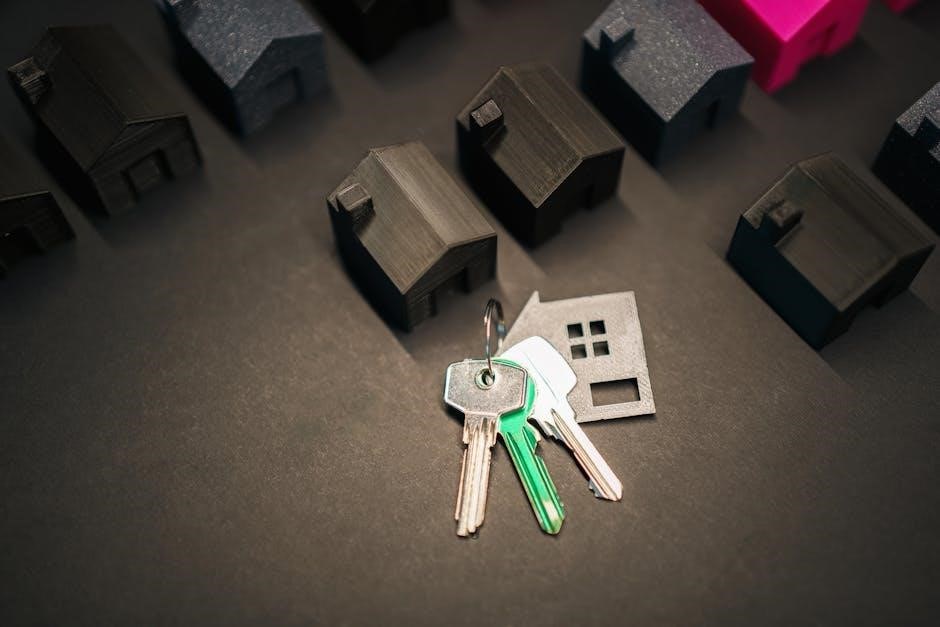Bad credit mortgages provide pathways to homeownership for individuals with low credit scores, offering specialized loan options like FHA loans for those with scores as low as 500.
What Are Bad Credit Mortgages?
Bad credit mortgages are specialized loan options designed for individuals with low credit scores or a history of financial difficulties. These mortgages, often referred to as subprime loans, cater to borrowers who may not qualify for conventional mortgage products due to poor credit history. Lenders offering bad credit mortgages typically charge higher interest rates and fees to compensate for the increased risk. While terms vary, some programs, such as FHA loans, allow borrowers with credit scores as low as 500 to qualify. Private lenders and government-backed loans also provide options for those with adverse credit. However, these mortgages often come with stricter conditions, such as larger down payments or higher monthly payments. Despite the challenges, bad credit mortgages offer a pathway to homeownership for those who might otherwise be excluded from the market.
Why Bad Credit Mortgages Are Important
Bad credit mortgages are crucial for individuals who face challenges in obtaining traditional mortgage approvals due to financial setbacks or low credit scores. These loan options provide a pathway to homeownership for those who may otherwise be excluded from the housing market. By offering specialized programs like FHA loans, bad credit mortgages enable borrowers to secure a home even with a history of financial difficulties. While these mortgages often come with higher interest rates and fees, they serve as a vital tool for rebuilding credit and achieving long-term financial stability. For many, bad credit mortgages represent a second chance to invest in a home and improve their financial future.

Understanding Bad Credit Mortgage Options
Bad credit mortgage options cater to individuals with low credit scores, offering pathways to homeownership through specialized loans like FHA and subprime mortgages, despite financial setbacks.
FHA Loans for Bad Credit
FHA loans are a popular option for borrowers with bad credit, requiring a minimum credit score of 500 for eligibility. These government-backed loans offer flexible terms, including lower down payments and more lenient credit requirements compared to conventional mortgages. Borrowers with scores between 500-579 typically need a 10% down payment, while those with 580 or higher qualify for a 3.5% down payment. FHA loans are ideal for first-time homebuyers or those recovering from financial setbacks, as they provide accessible pathways to homeownership. However, they often come with higher upfront and annual mortgage insurance premiums. Despite these costs, FHA loans remain a viable solution for many with poor credit histories, offering a chance to secure a mortgage when other options are unavailable.
VA Loans for Bad Credit
VA loans, guaranteed by the Department of Veterans Affairs, are an excellent option for eligible veterans, active-duty personnel, and surviving spouses with bad credit. These loans offer lenient credit score requirements, often allowing approval with scores as low as 580. Unlike conventional loans, VA loans require no down payment and no mortgage insurance, making homeownership more accessible. They also feature competitive interest rates and lower fees. While bad credit may present challenges, the VA’s flexible guidelines allow lenders to consider individual circumstances, such as stable income and debt-to-income ratios. This program is a lifeline for veterans with poor credit histories, providing opportunities to purchase or refinance a home without stringent financial barriers;
USDA Loans for Bad Credit
USDA loans, backed by the U.S. Department of Agriculture, are designed for borrowers purchasing homes in rural areas. These loans offer attractive terms, including no down payment requirements and lower mortgage insurance fees. While USDA loans typically require a credit score of at least 640, some lenders may consider applicants with lower scores if they demonstrate strong compensating factors, such as stable income or a low debt-to-income ratio. This program is particularly beneficial for individuals with bad credit who wish to purchase a home in a rural or suburban area. USDA loans also feature competitive interest rates and flexible underwriting guidelines, making them a viable option for those working to rebuild their credit while achieving homeownership.
Subprime Mortgages for Bad Credit
Subprime mortgages are designed for borrowers with poor credit histories, offering an alternative path to homeownership. These loans typically have less stringent credit score requirements but come with higher interest rates and fees due to the increased risk for lenders. Subprime mortgages often feature adjustable rates, which can lead to higher monthly payments over time. While they provide access to housing for those with bad credit, these loans carry significant risks, including potential for default and foreclosure. Borrowers should carefully evaluate their financial stability before opting for a subprime mortgage, as the long-term costs can be substantial. It is crucial to explore all available options and consult with a financial advisor to determine if a subprime mortgage aligns with your financial goals and capabilities.

How to Qualify for a Bad Credit Mortgage
Qualifying for a bad credit mortgage involves checking credit reports, reducing debt, and exploring specialized programs like FHA loans that accommodate lower credit scores.
Credit Score Requirements for Bad Credit Mortgages
While traditional mortgages typically require a credit score of 620 or higher, bad credit mortgages offer more flexibility. FHA loans, for instance, accept borrowers with scores as low as 580, though some subprime lenders may approve applications with scores below 500. However, lower scores often result in higher interest rates and stricter terms. To qualify, lenders may require a larger down payment or additional collateral. Borrowers with scores between 500 and 580 might still secure approval, but terms may be less favorable. Improving your credit score, even slightly, can significantly improve your mortgage options and reduce costs; It’s essential to compare lenders and programs to find the best fit for your financial situation.
Debt-to-Income Ratio for Bad Credit Borrowers
For bad credit borrowers, the debt-to-income (DTI) ratio plays a significant role in mortgage approval. Lenders typically prefer a DTI of 36% or less, but some may accept up to 43% for borrowers with compensating factors. A higher DTI ratio indicates a greater financial risk, which can lead to stricter terms or higher interest rates. Borrowers with poor credit should aim to reduce their DTI by paying down debts or increasing income before applying. Lenders may also require documentation to verify income stability and debt obligations. While DTI is crucial, it’s not the only factor considered, as some lenders specialize in accommodating borrowers with higher ratios. Managing your DTI effectively can improve your chances of securing a bad credit mortgage with more favorable terms.
Documentation Needed for Bad Credit Mortgages
When applying for a bad credit mortgage, borrowers must provide extensive documentation to demonstrate financial stability. This typically includes recent pay stubs, bank statements, and tax returns to verify income. Lenders may also require proof of employment history and a detailed list of debts and assets. For self-employed individuals, additional documentation such as profit-and-loss statements or business tax returns may be necessary. A clear explanation of past credit issues, such as bankruptcies or foreclosures, is often required to assess risk. Borrowers should also be prepared to provide a valid government-issued ID and proof of insurance. Ensuring all documentation is complete and accurate can help streamline the approval process, even with a low credit score or challenging financial history.

Available Mortgage Options for Bad Credit Borrowers
Bad credit borrowers can explore FHA, VA, USDA loans, subprime mortgages, and private lender options, offering tailored solutions with flexible credit score requirements and specialized programs.
Specialized Loan Programs for Bad Credit
Specialized loan programs are designed to help borrowers with poor credit histories achieve homeownership. These programs often feature lenient credit score requirements and unique terms. FHA loans, for instance, allow borrowers with scores as low as 500 to qualify with a 10% down payment. VA loans cater to veterans and active-duty military, offering zero-down options and flexible credit criteria. USDA loans target rural areas, providing 100% financing for eligible borrowers. Some lenders also offer alternative credit scoring models, considering non-traditional credit history like rent payments. These programs aim to bridge the gap for those struggling with traditional mortgage requirements, though they may come with higher interest rates or mortgage insurance. Exploring these options can provide pathways to homeownership despite credit challenges.
Private Lenders for Bad Credit Mortgages
Private lenders offer mortgage solutions for individuals with bad credit, providing options that may not be available through traditional banks or credit unions. These lenders often specialize in high-risk loans and may approve borrowers with lower credit scores or complex financial histories. Private lenders sometimes offer features like 100% financing, no down payment requirements, and no income limits, making homeownership more accessible. However, these loans typically come with higher interest rates, larger fees, and stricter terms compared to conventional mortgages. Borrowers should carefully compare private lender options, as terms can vary significantly. While private lenders provide opportunities for those with poor credit, it’s essential to weigh the benefits against the potential long-term financial implications. These lenders can be a viable pathway to homeownership for those who may not qualify elsewhere.
Government-Backed Loans for Bad Credit
Government-backed loans are a viable option for borrowers with bad credit, offering more flexible qualification criteria compared to conventional mortgages. The Federal Housing Administration (FHA) provides loans with credit score requirements as low as 500, making homeownership accessible to many with impaired credit. VA loans, designed for active-duty military members, veterans, and surviving spouses, also accommodate lower credit scores and often require no down payment. Similarly, USDA loans cater to borrowers in rural areas, offering favorable terms for those with subprime credit. These government-backed programs reduce lender risk, enabling approval for borrowers who might otherwise struggle to secure a mortgage. While terms may vary, government-backed loans provide a pathway to homeownership for individuals with bad credit, offering competitive rates and lower down payment requirements compared to private lenders;
Comparing Bad Credit Mortgage Lenders
Comparing bad credit mortgage lenders involves researching their criteria, interest rates, and terms to find the best fit for your financial situation and credit profile.
Mortgage Brokers vs. Banks/Credit Unions
When exploring bad credit mortgage options, understanding the difference between mortgage brokers and banks/credit unions is crucial. Mortgage brokers act as intermediaries, connecting borrowers with multiple lenders to find the best possible deal, especially for those with poor credit. They often have access to specialized lenders willing to work with bad credit applicants. In contrast, banks and credit unions typically offer stricter lending criteria, focusing on conventional loans with higher credit score requirements. While banks may provide better rates for those with good credit, they are less flexible for bad credit borrowers. Brokers, however, can navigate complex credit situations and negotiate terms, though they may charge fees. Ultimately, choosing between a broker and a direct lender depends on your financial situation and credit history.
Online Lenders vs. Traditional Lenders
Online lenders and traditional lenders differ significantly in their approach to bad credit mortgages. Online lenders offer greater convenience with faster application processes and the ability to apply from home. They may have more flexible credit requirements, making it easier for individuals with poor credit to qualify. However, this convenience often comes with higher interest rates and fees compared to traditional lenders. Traditional lenders, such as banks and credit unions, typically adhere to stricter credit standards, making it harder for bad credit borrowers to secure a loan. Despite this, they may offer more competitive rates and terms for those who qualify. Online lenders might provide specialized loan products tailored for bad credit, whereas traditional lenders usually stick to standard loan offerings. The choice between the two depends on individual financial circumstances, with online lenders being more accessible for those with lower credit scores and traditional lenders offering potentially better terms for eligible borrowers.
Improving Your Credit Score for Better Mortgage Options
Enhancing your credit score involves paying bills on time, reducing debt, and avoiding new credit inquiries. Monitoring credit reports and addressing errors can also boost your creditworthiness.
How to Improve Your Credit Score
Improving your credit score requires consistent effort and smart financial habits. Start by paying all bills on time, as payment history accounts for a significant portion of your score. Reduce debt by focusing on high-interest loans and credit cards, aiming to keep credit utilization below 30%. Avoid applying for new credit unnecessarily, as hard inquiries can lower your score. Monitor your credit report regularly and dispute any errors or inaccuracies. Building a long-term positive credit history is key, as lenders prefer borrowers with stable, responsible financial behavior. Over time, these practices can significantly enhance your creditworthiness and open up better mortgage opportunities.
Managing Debt to Enhance Creditworthiness
Managing debt effectively is crucial for improving your creditworthiness and securing better mortgage options. Start by prioritizing high-interest debt, as paying these down first can significantly reduce your financial burden. Aim to keep your credit utilization ratio below 30%, as this demonstrates responsible borrowing behavior. Avoid accumulating new debt, especially before applying for a mortgage, as excessive inquiries and new accounts can harm your credit score. Consider consolidating debt into lower-interest loans or credit cards to simplify payments and reduce overall interest. By maintaining consistent, timely payments and avoiding unnecessary credit inquiries, you can gradually improve your financial health and strengthen your mortgage application.

Tips for Getting a Bad Credit Mortgage
Compare lenders, explore specialized programs, and improve your credit score to enhance approval chances. Consider down payments and co-signers to strengthen your application.
Exploring Alternative Credit Scoring Models
Alternative credit scoring models, such as VantageScore or FICO XD, consider non-traditional data like rent payments, utility bills, or social media activity to assess creditworthiness. These models can help borrowers with thin or damaged credit histories qualify for mortgages. Some lenders use manual underwriting to review applications more holistically. While these options may improve approval chances, they often come with higher interest rates or stricter terms. It’s important to research lenders that accept alternative scoring methods and understand their specific requirements. Additionally, improving traditional credit habits remains crucial for long-term financial health. Exploring these options carefully can open doors to homeownership for those with limited credit options.
Considering Co-Signers for Bad Credit Mortgages
Adding a co-signer with good credit can significantly improve your chances of securing a bad credit mortgage. A co-signer essentially shares the financial responsibility of the loan, reducing the lender’s risk. This can lead to better loan terms, such as lower interest rates or smaller down payments. However, it’s important to carefully consider the implications, as the co-signer will be legally obligated to repay the loan if you default. Both parties should fully understand the risks and benefits before proceeding. Additionally, not all lenders allow co-signers, so it’s crucial to verify this option with potential lenders. A co-signer with a strong financial profile can make a bad credit mortgage more accessible and affordable. Ensure open communication and trust between all parties involved.
Bad credit mortgages offer viable pathways to homeownership, despite higher rates and stricter terms. Exploring options like FHA loans or co-signers can help overcome credit challenges effectively.
Deciding if a Bad Credit Mortgage is Right for You
Choosing a bad credit mortgage requires careful consideration of your financial situation and long-term goals. While these loans offer homeownership opportunities, they often come with higher interest rates, larger down payments, and stricter terms. Borrowers with very low credit scores (below 500) may find it challenging to qualify, but options like FHA loans can still be accessible with a score of 500 or higher. It’s essential to weigh the benefits of owning a home against the potential financial strain of higher mortgage costs. Consulting with a financial advisor or mortgage broker can help you determine if a bad credit mortgage aligns with your financial stability and goals. Additionally, improving your credit score before applying may lead to more favorable terms and lower costs over time.
Final Thoughts on Bad Credit Mortgage Options
Bad credit mortgage options provide a pathway to homeownership for those with less-than-perfect financial histories. While these loans often come with higher costs and stricter terms, they can be a viable solution for many borrowers. Exploring specialized programs like FHA loans or working with private lenders can help you secure a mortgage despite credit challenges. However, it’s crucial to carefully evaluate your financial situation and consider long-term implications; Improving your credit score or saving for a larger down payment may lead to better loan terms in the future. Ultimately, bad credit mortgages can be a stepping stone toward homeownership, but it’s essential to approach them with caution and seek professional guidance to make an informed decision.
Alternatives to Bad Credit Mortgages
Renting or delaying homeownership to improve credit scores can be smarter choices than accepting high-interest bad credit mortgages with unfavorable terms;
Renting vs. Buying with Bad Credit
Renting can be a more affordable option for individuals with bad credit, as it avoids the high interest rates and fees associated with bad credit mortgages. Additionally, renting requires a smaller upfront investment, typically a security deposit and the first month’s rent, making it more accessible for those with limited savings. This option also provides flexibility, allowing renters to move more easily without the long-term financial commitments of homeownership.
On the other hand, buying a home with bad credit can lead to higher costs due to less favorable loan terms. Borrowers may face larger down payments, higher interest rates, and stricter repayment conditions. However, for those determined to own a home, options like FHA loans or working with specialized lenders can make homeownership possible, though careful financial planning is essential to manage the added expenses.
Waiting to Improve Credit Before Applying
Waiting to improve your credit score before applying for a mortgage can be a strategic decision to secure better loan terms. A higher credit score often leads to lower interest rates, reduced fees, and more favorable loan conditions. By addressing past credit issues, such as paying down debt or resolving delinquencies, borrowers can strengthen their financial profile. This approach may also increase purchasing power and reduce long-term financial strain.
Improving credit typically requires time and effort, but the benefits can significantly outweigh the wait. Borrowers should focus on reducing debt, avoiding new credit inquiries, and monitoring their credit report for accuracy. While delaying homeownership may seem inconvenient, the long-term advantages of better mortgage terms make it a worthwhile consideration for many.
